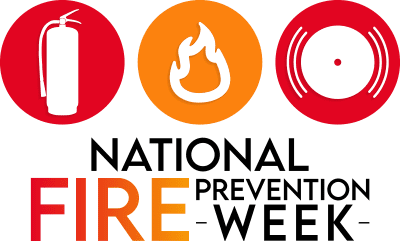 Fire Prevention Week was established in 1925 to remember the great Chicago fire of 1871, which burned more than 17,400 structures, over 2000 acres, and impacted thousands of lives.
Fire Prevention Week was established in 1925 to remember the great Chicago fire of 1871, which burned more than 17,400 structures, over 2000 acres, and impacted thousands of lives.
The week aims to educate the public with useful tips to prevent tragedies like this from happening in the future. Every year, Fire Prevention Week is given a theme it focuses on. This year’s theme is “Learn the Sounds of Fire Safety.” And it’s no surprise that the sounds of fire safety were chosen as this year’s theme. It is well documented that smoke alarms and carbon monoxide (CO) detectors can profoundly affect fire safety if we know what to listen for.
For example, the NFPA reports that working smoke alarms reduce the risk of death during a fire by over 50 percent. They also found that 41 percent of household fire deaths occur in homes with no smoke alarm and that 16 percent happened in homes with alarms that failed to activate.
And though smoke alarms have been instrumental in saving countless lives, there are still steps we can take to make them even more effective and keep our workplaces even safer. Though mainly our company works closely with other businesses to meet their fire and life safety needs; we all have our own personal dwellings and families to protect as well.
Below we’ll discuss what you need to know about smoke alarms and CO alarms and some tips for keeping yourself and your coworkers safe.
Smoke Alarms
- If you hear a set of three loud beeps (BEEP BEEP BEEP), the alarm has detected smoke or fire in the building. Your next steps should be to get out of the building, call 9-1-1, and stay out.
- If you hear just one chirp from your smoke alarm every 30 or 60 seconds, this means its battery is low and needs to be replaced.
- If you replace the battery and your smoke alarm continues to chirp, this means the alarm itself is due for replacement. No matter what, all smoke alarms must be changed after 10 years.
CO Alarms
- If you hear four loud beeps (BEEP BEEP BEEP BEEP), your CO alarm has detected carbon monoxide in your building. After you hear these beeps, leave your building, call 9-1-1, and stay outside.
- If your CO alarm chirps once every 30 or 60 seconds, the battery must be replaced.
- If your CO alarm continues chirping with a fresh battery in place, this means the alarm must be replaced.
Fire Safety Tips
- Because you don’t know who may be visiting your business or residence, it is best to make sure all of your smoke and CO alarms throughout the property work for those with physical and sensory disabilities.
- Install a low-frequency alarm for those with mild to severe hearing loss.
- Encourage everyone in your building to keep their glasses and phone on them at all times.
- Make sure all stairways and hallways are adequately lit and have a clear walking path so everyone can evacuate safely.
Make sure your coworkers know all of the above sounds and tips for fire safety, so everyone remains safe at your place of business.




